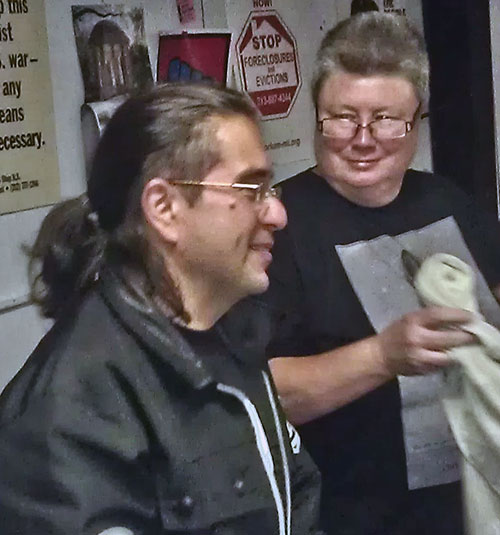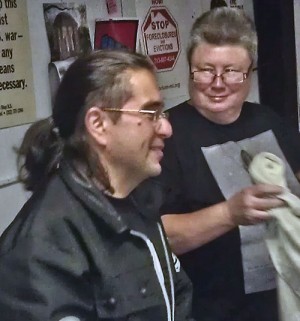

Left, Jorge Parra of GM hunger strikers in Colombia with Martha Grevatt at Sept. 10 Detroit meeting.WW photo: Abayomi Azikiwe


Left, Jorge Parra of GM hunger strikers in Colombia with Martha Grevatt at Sept. 10 Detroit meeting.
WW photo: Abayomi Azikiwe
March 23 marked the 600th day of occupation outside the U.S. Embassy in Bogota, Colombia, by a group of fired auto workers. The members of Asotrecol — Association of Workers and Ex-workers of GM Colmotores — set up the encampment Aug. 1, 2011, to draw attention to the cases of more than 200 workers who were fired after being injured on the job.
After General Motors had their conditions classified as nonoccupational, the injured workers could not collect workers’ compensation. Asotrecol targeted the embassy because of the U.S. government’s role in bailing out GM and its ownership stake at the time the occupation began.
One year later, a courageous group of fired workers was still living in the makeshift structures, but management at GM’s Colombian plant still refused to meet with them. Thirteen workers launched a dramatic hunger strike, sewing their lips shut. This got GM to agree to mediation. The hunger strike was lifted, only to be resumed when the company’s final offer was not even enough money to cover the surgeries these workers needed.
Shortly thereafter Asotrecol President Jorge Parra came to Detroit, hoping to meet with GM corporate executives here. By this time supporters in Detroit and Ann Arbor, Mich., had demonstrated outside GM world headquarters. Actions in solidarity with Asotrecol were taking place across the country.
Last October, when it appeared that the UAW would work with GM to reach a settlement, the second hunger strike was suspended. When no progress was made, Parra resumed the hunger strike Nov. 22.
Supporters ramped up solidarity efforts. In December they held a vigil outside the home of GM Vice President for Labor Relations Cathy Clegg. In January GM’s awful treatment of injured workers was exposed to the international media during the North American International Auto Show. An Occupy Wall Street-style “mic check” inside the auto show demanded GM negotiate with Asotrecol. These efforts were replicated at auto shows in Chicago and Portland, Ore.
After 72 days Parra ended his third heroic hunger strike.
While in Detroit Parra became well known and respected. He spoke to UAW members, students, civil rights organizations, churches, anti-foreclosure activists and others. He moved listeners with his compelling story of workers being worked so hard they were incapacitated before age 40 and then fired with no source of income because they could not produce profits for GM.
On March 2, Parra returned to Colombia to continue the struggle there. The resistance in Bogota and here has had an impact inside the plant there. GM is finally investing in new equipment to reduce ergonomic injuries. Injured workers have been keeping their jobs and are leading an organizing drive for a new union inside the plant, which after less than a year has about 200 members. This is in Colombia, the most dangerous country in the world for trade unionists.
Autoworkers connect struggles
An aggressive fundraising push in Detroit, which began in December with a collection outside this writer’s Chrysler plant, has raised more than $7,000 to help the families of the Colombia encampment survive and maintain that symbol of resistance.
Many auto workers attended a “Salsa Night” fundraiser at the hall of UAW Local 909 — which represents workers at the GM Powertrain plant — on March 22. Auto workers from Locals 909, 140, 869, 412 and 600 all spoke on why solidarity with Colombian workers was important to them. Local 909 President Butch Barber explained why he made the hall, which is usually rented for a charge, available at no cost for this fundraiser.
The vice president of the 909 retirees’ chapter, which donated hundreds of dollars to the families in Bogota, gave heartfelt remarks. Chrysler worker and Local 140 former President Melvin Thompson described his decision to wage a 23-day hunger strike in solidarity with Parra. Local 909 former President Frank Hammer led the discussion. In a show of labor-community solidarity, the fundraiser was initiated by Debra Simmons of the Detroit chapter of National Action Network, which is fighting the imposition of an emergency financial manager on Detroit.
Alex Wassell, a member of Local 869 who was fired by Chrysler after organizing a protest against unpopular work schedules, connected the fight here to the fight in Colombia. Wassell was discharged after being quoted in the Detroit News as suggesting that the “3-2-120” schedule — under which workers work 10-hour days and weekends for straight time — could negatively affect morale and quality.
The company charged that Wassell violated a code of conduct for “engaging in, participating in, encouraging or approving of conduct constituting or appearing to constitute a conflict with the interests of the Company.” Both GM and Chrysler’s rules essentially prohibit resistance to policies that, in “the interest of the Company,” conflict with the interests of the workers!
There is widespread anger at this outrageous firing. Wassell’s supporters have called the company in protest. Plant workers are collecting funds and circulating petitions to demand that he be reinstated. The Michigan chapters of the American Civil Liberties Union and the National Lawyers Guild have protested the violation of freedom of speech.
All over the world, unionists face firing, imprisonment, torture and even assassination when they stand up to their bosses. The global struggle is uniting the workers of the world against their common capitalist enemy.
Grevatt is a longtime Chrysler worker and member of the United Auto Workers.
In the 1950s, when Japan and much of Europe was in ruins, the U.S. accounted…
This “Call from the General Federation of Trade Unions in Gaza to Labor Unions in…
Desde que la administración de Donald Trump/Elon Musk tomó las riendas del poder a finales…
Philadelphia Palestine activists marched from Philadelphia City Hall to Day & Zimmermann on April 18…
Marching up Blue Hill Avenue through the Black and immigrant Dorchester neighborhood, Trans Day of…
This statement was recently issued by over 30 groups. On Friday, March 28, Dr. Helyeh…